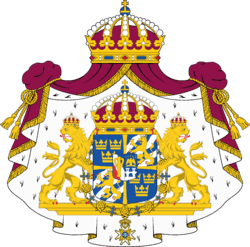Law enforcement in Sweden
Law enforcement in Sweden is carried out by several government agencies, under the guidance of the Government of Sweden.
Structure
The administration of both law enforcement and the judiciary of Sweden are the responsibility of the Ministry of Justice, a cabinet-level department in the government of Sweden, headed by the Minister of Justice.[1] The Ministry is primarily concerned with legislation, and the actual day-to-day administration is the responsibility of the National Police Board (Rikspolisstyrelsen).[2]
The organization mainly tasked with law enforcement is the Swedish Police Service. In addition, under certain circumstances other government agencies can be tasked with law enforcement, including investigations, arrest/probatory powers, or enforcement of judgments. Just like in the United States, Swedish law has provisions similar to the U.S. Posse Comitatus Act which limits the use of the military to perform the tasks of law enforcement agencies in time of peace.
This rule has recently come under review, in light of the upsurge of terrorist activity following the 9/11 attacks and the bombings in Bali, Madrid and London it has been suggested that the military should be allowed to aid the police in certain situations of heightened tension.
Agencies under the Ministry of Justice
Swedish Police Service
The Swedish Police Force includes:
- The Swedish National Police Board, the central administration
- Swedish National Laboratory of Forensic Science
- The National Bureau of Investigation, Rikskriminalpolisen (RKP), which fights organized crime
- The Swedish Security Service, Säkerhetspolisen (SÄPO), which fights terrorism and threats to national security
- National Task Force, Nationella insatsstyrkan (NI), a special operations unit that supplements the three local Piketen units
- County Police Authorities
Swedish Economic Crime Authority
The Swedish Economic Crime Authority, or Ekobrottsmyndigheten, is a multidisciplinary law enforcement agency with the responsibility to both investigate and prosecute in cases of economic crimes. Similar multidisciplinary organizations are the Økokrim in Norway and the Scorpions in South Africa.
Swedish Prosecution Authority
The Swedish Prosecution Authority (Swedish: Åklagarmyndigheten) is the principal agency in Sweden responsible for public prosecutions. It is headed by the Prosecutor General of Sweden.
Swedish prosecutors, belonging or not to the authority, are responsible for leading and supervising criminal investigations done by the Swedish Police, and preparing and presenting cases for the courts. The prosecutors also hold a number of quasi-judicial powers like, though not officially, acting as judges in several misdemeanor cases.
There are also a couple of Swedish prosecution agencies, independent of the SPA such as the Swedish Chancellor of Justice, which is independent of the national government, and the Parliamentary Ombudsman. The Chancellor of Justice is responsible for supervising the lawfulness of government actions. The Parliamentary Ombudsman is responsible for supervisiing public authorities and also has powers to act as a special prosecutor and bring charges against public officials for malfeasance or some other irregularity. This happens very rarely.
Chancellor of Justice
The Chancellor, roughly the Attorney General of Sweden, acts, besides supervising lawyers and public officials, as a special prosecutor in several cases. The Chancellor does have, as being a prosecutor, investigative powers in cases regarding misconduct of lawyers and public officials, and violations of the Swedish laws dealing with press freedom.
Swedish Corrections Service
The Swedish Prison and Probation Service, or Kriminalvården does have, besides duties as guarding prisons and keeping arrested suspects in jail, certain powers to track down escaped convicts.
National Board of Forensic Medicine
The Board, Rättsmedicinalverket, is the main Swedish coroner agency.
Agencies under the Ministry of Finance
Swedish Customs Service
The Swedish Customs Service, or Tullverket, performs duties related to law enforcement including border guard duties and the trace of illegal narcotics attempted to be smuggled into the country.
Swedish Enforcement Administration
The Swedish Enforcement Administration, or Kronofogdemyndigheten is the law enforcement service of the Swedish National Tax Board with duty to carry out judgments. It is also the main distraint authority in Sweden.
Agencies under the Ministry of Defence
Swedish Coast Guard
The Swedish Coast Guard, or Kustbevakningen enforce Swedish law on the sea, independently or together with the Swedish Police. This includes sobriety tests of the operators of any marine vessel.
Swedish Military Police
The Swedish military police is the law enforcement service of the Swedish Armed Forces. The Life Guards is responsible for training military police soldiers, Royal Guards and other guards. The duties of the military police outside the military may include protection and safety of foreign Heads of State.
The connection between the military police units and the Life Guards is similar to the structure in the Swedish Police Service; the Life Guard is responsible for service, coordination and development of the military police, and the local unit is responsible to investigate and keep law and order at the camp.
Agencies under the Ministry of Health and Social Affairs
National Board of Institutions
The Swedish National Board of Institutions is the Swedish youth probation agency.
Transportation
Originally, Swedish police cars were black. In the 1960s, the cars were painted black with white fenders and roof. The roof was later painted black on request from the police forces in northern Sweden as a white roof made the car nearly invisible in the snow. In the 1980s the cars were painted white with discreet stickers and police crests in blue and yellow.
This led to less visibility and received criticism. Therefore, the fenders were painted blue and the stickers changed, making the cars look like in the 1960s but in blue instead of black. As of 2005, Sweden uses blue and fluorescent yellow stickers according to the Battenburg pattern. Most of Swedish police cars are either Volvos or Saabs.
-

Swedish Porsche highway patrol car, (1970's)
-

1974 Plymouth Valiant (-1980's)
-

Swedish patrol car, old livery (-2005)
-
Swedish patrol car, new livery (2005-)
See also
Notes
- ↑ Terrill 2009, p. 229.
- ↑ Terrill 2009, pp. 229–230.
References
- Terrill, Richard J. (2009). World Criminal Justice Systems: A Survey (7 ed.). Elsevier. ISBN 978-1-59345-612-2.
| |||||||||||||||||||||||||||||||||||||||||
| ||||||||||||||||||

